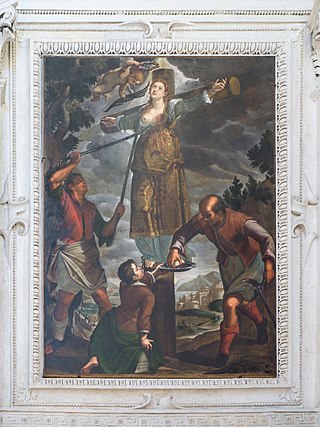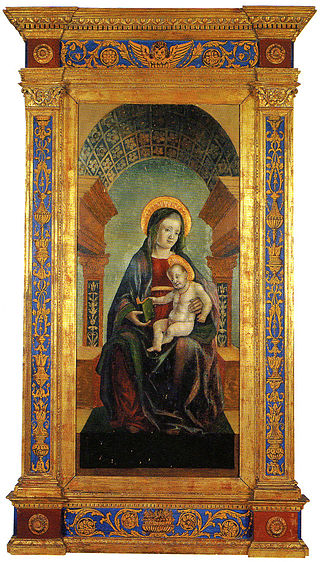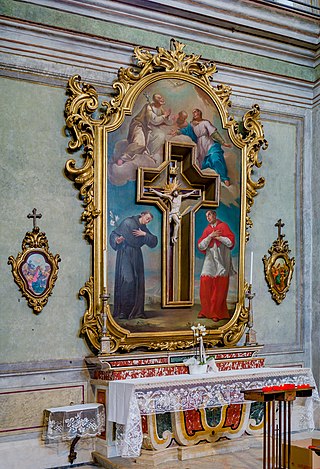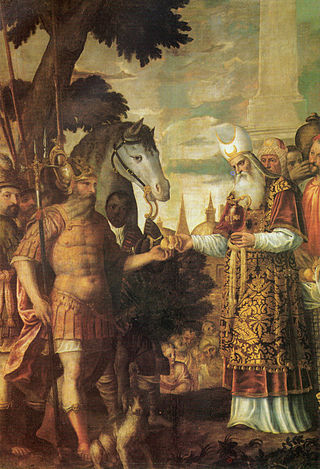
Alessandro Bonvicino, more commonly known as Moretto, or in Italian Il Moretto da Brescia, was an Italian Renaissance painter from Brescia, where he also mostly worked. His dated works span the period from 1524 to 1554, but he was already described as a master in 1516. He was mainly a painter of altarpieces that tend towards sedateness, mostly for churches in and around Brescia, but also in Bergamo, Milan, Verona, and Asola; many remain in the churches they were painted for. The majority of these are on canvas, but a considerable number, including some large pieces, are created on wood panels. There are only a few surviving drawings from the artist.

Giovanni Antonio Capello was an Italian painter of the late-Baroque period, active mainly in Brescia.

Grazio Cossali, sometimes called Orazio Cossali was an Italian painter who worked in Brescia, Cremona, and Venice, active during the Mannerist or early Baroque periods.

Floriano or Fioravante Ferramola was an Italian painter of the Renaissance period, active mainly in Brescia.

Giacomo Barucco was an Italian painter, active in a Mannerist style.

Filippo Zaniberti (1585–1636) was an Italian painter of the late Mannerist period.

Giorgio Duranti was an Italian painter and cleric of the Baroque period, mainly active in Brescia, where he was born. An entry in Dandolo's study of the late Venetian Republic states a 1755 as year of death, and that many of his works were in the Royal Gallery of Turin, which was the nucleus of the Sabauda Gallery.

Lodovico Gallina was an Italian painter of the Baroque period, mainly active in Brescia. Born to poor parents in Brescia, he was initially a pupil of Antonio Dusi. Under the patronage of Luigi Chizzola and Faustino Lechi, he was sent to be instructed in the Accademia di Belle Arti in Venice.

Antonio Dusi was an Italian painter of the Baroque period, mainly active in Brescia. He was initially a pupil of Antonio Paglia. One of his pupils was Santo Cattaneo.

Pietro Marone was an Italian painter of the late-Renaissance periods, mainly active in Brescia and Mantua.

Francesco Monti (il Brescianino) (1646–1703) was an Italian painter of the late-Baroque period, mainly active in his natal city of Brescia, as well as Parma.

Francesco Paglia was an Italian painter of the late-Baroque period, mainly active in Brescia.
Francesco Ricchino was an Italian architect of the Renaissance period, born in Rovato and mainly active in his native Brescia.
Cristoforo Rosa was an Italian painter of quadratura of the Renaissance period.

Tomasso Sandrino (1575–1631) was an Italian painter of quadratura in Northern Italy, active in his native Brescia.

Francesco Savani was an Italian quadratura painter of the Rococo period. He was born in Brescia, Republic of Venice, and active mainly there. When his father sent him to study letters and sciences at a Jesuit school, he entertained himself by drawing portraits of his teachers. His first art training was with Brescian painter Angelo Paglia. He then studied with Francesco Monti, who had come from Bologna to paint in the Chiesa della Pace. Savani's style ultimately came to reflect that of Giambattista Pittoni. Savani's works at Coccaglio were admired by Tiepolo. Savani died impoverished, said to have been brought to ruin by a prostitute.

Giuseppe Tortelli was an Italian painter of the late Baroque period, active in Brescia.

Camillo Rama was an Italian painter, active in his native city of Brescia.

The church of San Gaetano is an ancient church located on Via Calegari at the intersection of Via Monti in Brescia.

Sante Cattaneo or Santo Cattaneo was an Italian painter of the Neoclassic period, mainly active in Brescia.


















